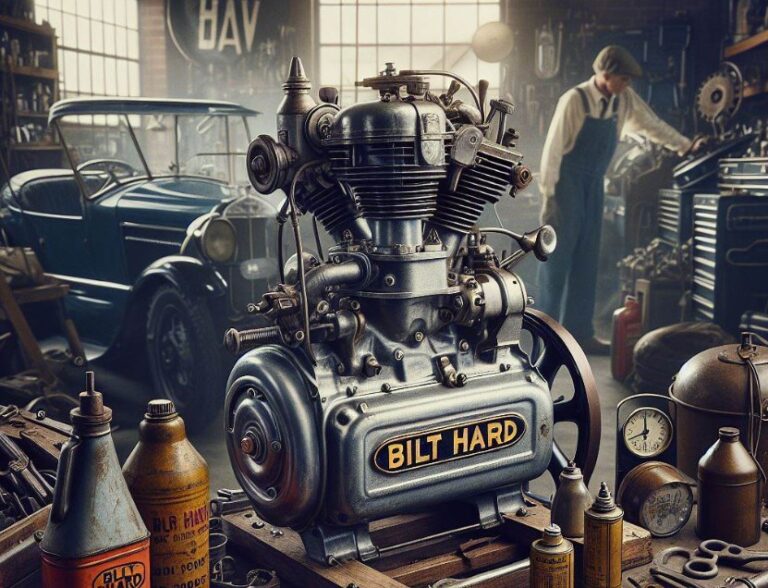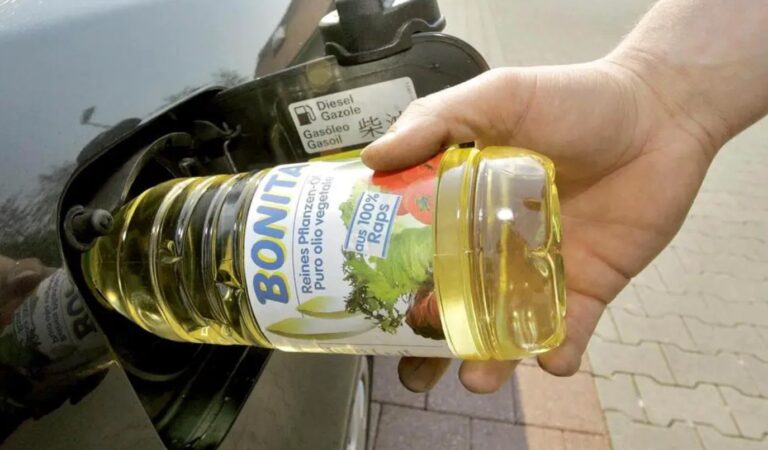Can You Spray Carburetor Cleaner While Engine Is Running?
Are you looking for Can You Spray Carburetor Cleaner While Engine Is Running? This question is crucial for those handling vehicle maintenance and seeking efficient ways to clean their carburetors.
Understanding the dos and don’ts of using carburetor cleaner can significantly impact the performance and longevity of your engine. In this article, we’ll dive deep into this subject, exploring the mechanics, safety precautions, and best practices for using carburetor cleaner on a running engine.
Key Takeaways
- Understanding Carburetors: Grasping the basics of how carburetors work and their role in engine performance.
- Safety Precautions: Highlighting the necessary safety measures when using carburetor cleaner.
- Effective Use: Outline the correct and efficient way to apply carburetor cleaner.
- Impact on Engine Health: Discuss how this practice affects engine performance and longevity.
Can You Spray Carburetor Cleaner While Engine Is Running?
Yes, you can spray carburetor cleaner while the engine is running, but it must be done with caution. Spraying cleaner into a running engine can help remove dirt and grime from the carburetor. However, it’s essential to understand the process and safety precautions to avoid damaging the engine.
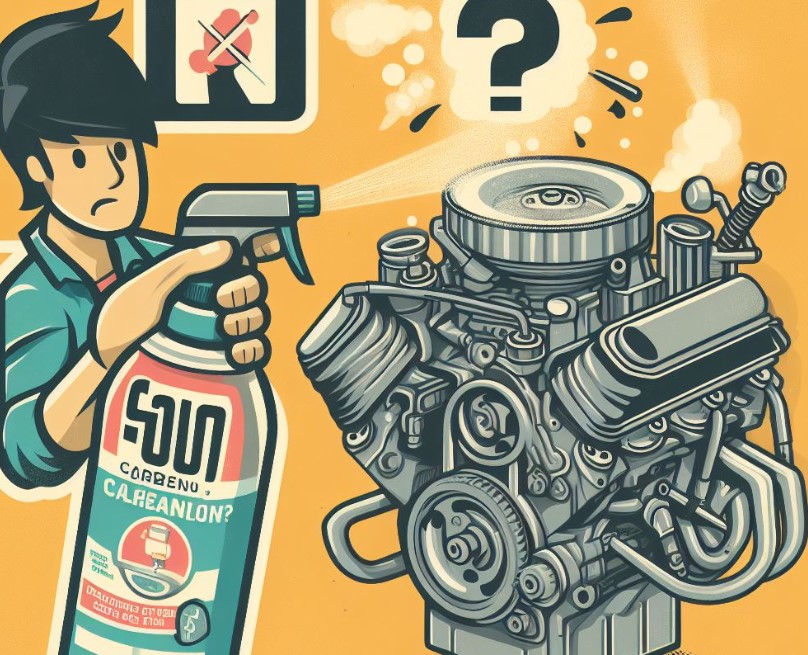
Understanding the Process
Using a carburetor cleaner on a running engine involves spraying the cleaner directly into the carburetor’s throat. This helps in breaking down and removing the deposits and contaminants that accumulate over time.
Safety Precautions
Safety is paramount when dealing with flammable substances and running engines. Ensure the engine is not overheating, and always wear protective gear like gloves and goggles.
Mechanics of a Carburetor
The carburetor is a critical component of an engine, responsible for mixing air and fuel in the proper ratio. Understanding its mechanics is essential for proper maintenance.
Role in Engine Performance
The carburetor’s efficiency directly impacts engine performance. A clean carburetor ensures smooth engine operation and optimal fuel consumption.
Issues with Dirty Carburetors
A dirty carburetor can lead to various issues like engine stalling, rough idling, and poor fuel economy. Regular cleaning is therefore crucial.
Safety Considerations When Using Carburetor Cleaner
While using carburetor cleaner, safety should never be compromised. The flammable nature of the cleaner and the complexity of the task demand careful handling.
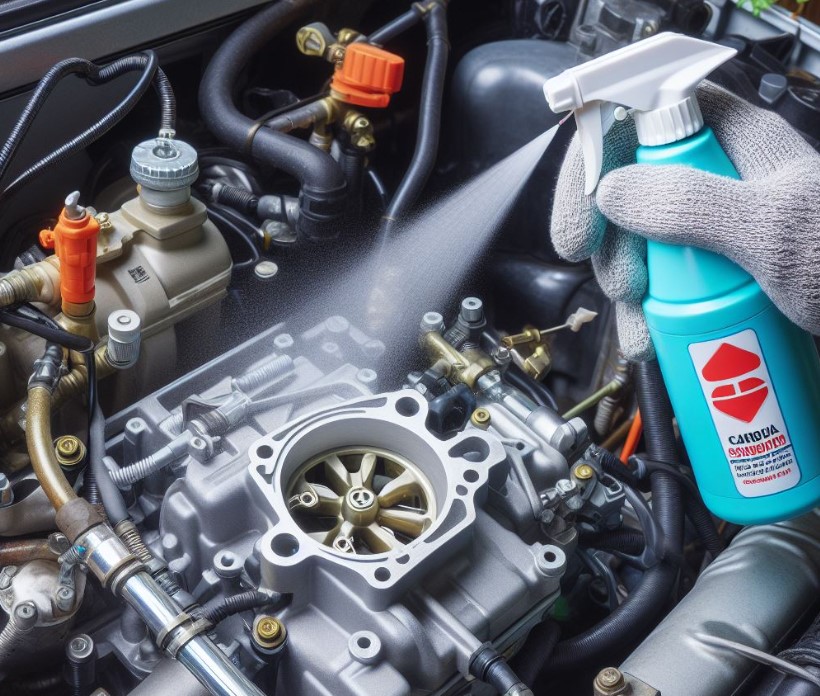
Personal Protective Equipment
Always wear appropriate protective gear, including gloves and safety goggles, to safeguard against accidental splashes and fumes.
Environmental Precautions
Use the cleaner in a well-ventilated area and dispose of any waste materials responsibly to minimize environmental impact.
Best Practices for Applying Carburetor Cleaner
Applying carburetor cleaner correctly ensures effective cleaning without damaging the engine or carburetor components.
Step-by-Step Guide
Follow a structured approach: start the engine, spray the cleaner in short bursts, and allow the engine to run for a few minutes afterward.
Dos and Don’ts
Do use the cleaner in moderation and don’t spray it on hot engine parts to avoid the risk of fire.
Impact of Carburetor Cleaning on Engine Health
Regular cleaning of the carburetor can have a significant positive impact on the engine’s health and longevity.
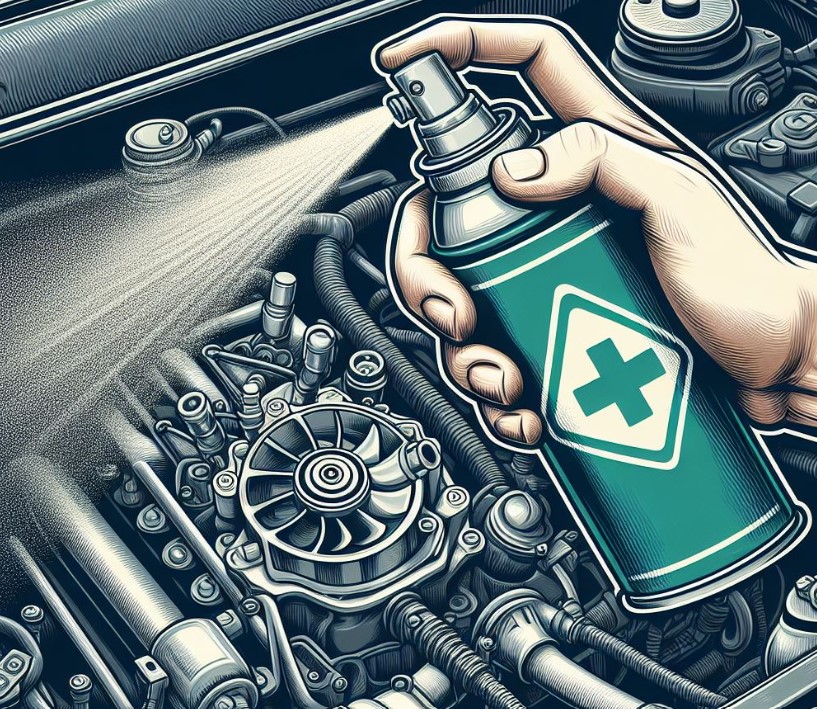
Improved Engine Performance
A clean carburetor ensures a better fuel-air mixture, leading to smoother engine operation and improved performance.
Longevity of the Engine
Regular maintenance, including carburetor cleaning, extends the engine’s lifespan by preventing buildup and corrosion.
Advanced Tips for Maintaining Your Carburetor
Maintaining your carburetor extends beyond just cleaning. It involves understanding the nuances of its operation and care.
Periodic Check-ups
Regular check-ups and cleaning sessions prevent long-term issues and maintain optimal engine performance.
Recognizing Warning Signs
Be aware of signs like rough idling or difficulty starting the engine, as these could indicate a dirty carburetor.
Can You Use A Carb Cleaner While An Engine Is Running?
Yes, you can use a carb cleaner while an engine is running, but it must be done with caution. This method is particularly effective for minor cleaning tasks, where the goal is to remove build-up or solve minor performance issues.
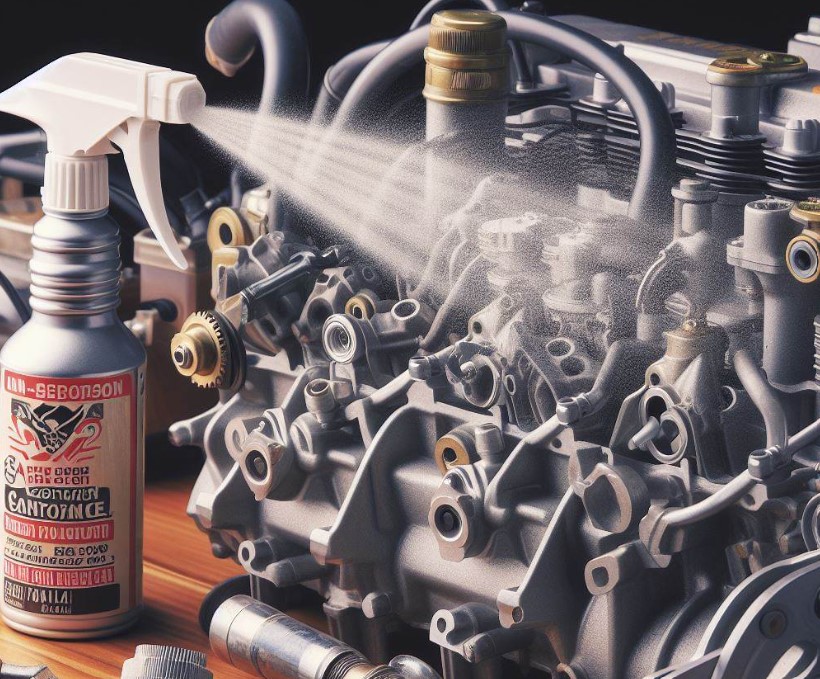
It’s crucial to use the cleaner specifically designed for carburetors and follow the instructions carefully. The engine should be at a stable temperature (not overheating), and safety measures should be strictly adhered to. However, this method may not be as effective for heavily clogged carburetors, where a more thorough cleaning might be required.
How Do You Use Spray Carb Cleaner While Engine Is Running?
Using a carb cleaner while the engine is running involves a few steps:
- Start the Engine: Warm up the engine to a normal operating temperature.
- Locate the Carburetor: Identify the carburetor’s air intake.
- Spray the Cleaner: While the engine is idling, spray the carburetor cleaner directly into the air intake in short bursts.
- Let the Engine Run: Allow the engine to run for a few minutes after spraying. This helps the cleaner circulate and clean effectively.
- Repeat if Necessary: For stubborn grime, a second application may be needed.
It’s important to avoid overuse, as too much cleaner can flood the engine.
Where Should You Not Spray Carb Cleaner?
Carb cleaner should not be sprayed on:
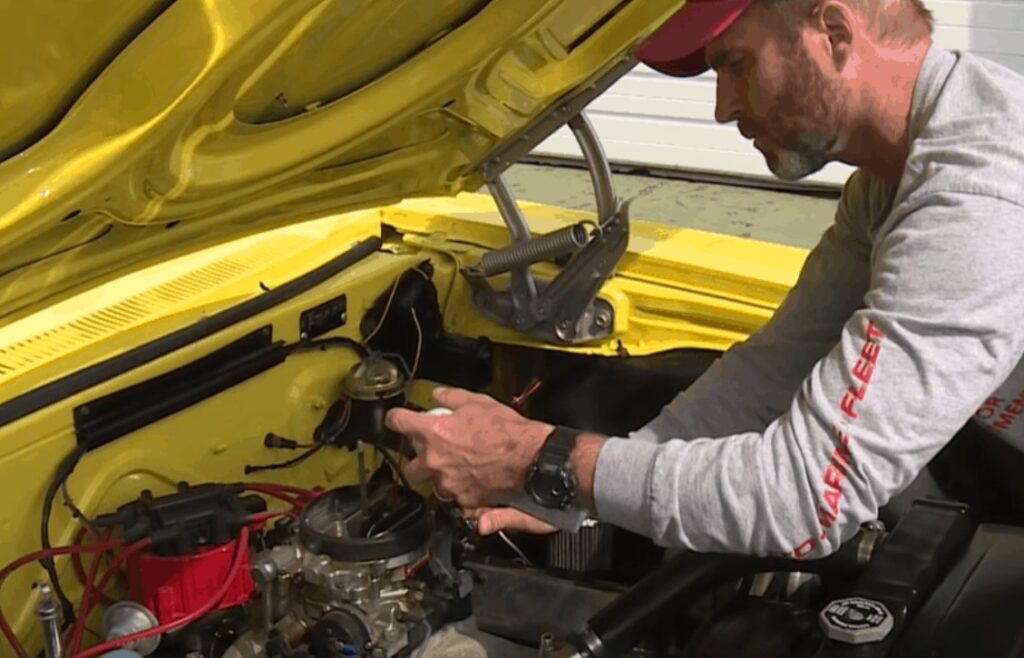
- Hot Engine Parts: Avoid spraying on overheating components to prevent the risk of fire.
- Rubber and Plastic Parts: Carb cleaners can damage rubber gaskets, seals, and plastic parts.
- Electrical Components: Avoid direct contact with electrical components to prevent damage and potential electrical hazards.
- Painted Surfaces: Carb cleaner can strip paint, so it should be used carefully to avoid overspray on the vehicle’s body.
It’s essential to focus the spray directly on the carburetor and avoid these sensitive areas.
What Precautions Should Be Taken When Using Carburetor Cleaner?
When using carburetor cleaner, take the following precautions:
- Wear Protective Gear: Use gloves and safety goggles to protect from chemicals and fumes.
- Work in a Ventilated Area: Ensure good ventilation to avoid inhalation of toxic fumes.
- Avoid Flames and Sparks: Keep away from open flames or sources of ignition, as the cleaner is highly flammable.
- Follow Instructions: Use as directed, focusing on the carburetor and avoiding sensitive areas.
- Dispose of Waste Properly: Dispose of any waste material responsibly and according to local regulations.
Following these precautions helps ensure personal safety and minimizes the risk of damage to the vehicle.
Can You Clean A Carburetor Without Removing It?
Yes, cleaning a carburetor without removing it is possible and often done using carburetor cleaners. This method is suitable for light to moderate cleaning tasks, where spraying the cleaner directly into the carburetor while the engine is running helps dissolve and remove dirt and build-up.

However, for deep cleaning or when dealing with heavily clogged carburetors, removal and manual cleaning might be necessary. Cleaning without removal is convenient and time-saving, but it may not address all types of buildup effectively.
Conclusion
In conclusion, spraying carburetor cleaner while the engine is running can be beneficial for engine maintenance. It is a practical approach to removing dirt and grime, enhancing engine performance, and ensuring longevity.
However, it’s crucial to follow the correct procedures and safety measures to prevent damage to the engine and ensure personal safety. Regular maintenance, including careful use of carburetor cleaner, is key to keeping your engine in top condition.
Top FAQ’s
Carburetor cleaner is effective for removing dirt and grime, but it might not resolve all issues, especially those related to mechanical failures or worn-out parts. In such cases, parts replacement or professional servicing might be necessary.
Are there environmental concerns with using carburetor cleaner?
Yes, carburetor cleaners contain chemicals that can be harmful to the environment. Use them in well-ventilated areas and dispose of any waste material according to local regulations to minimize environmental impact.
How do I know if the carburetor cleaner has worked?
You should notice improved engine performance, smoother idling, and better fuel efficiency. If issues persist, a more thorough cleaning or professional inspection may be necessary.
Can carburetor cleaner be used on fuel-injected engines?
Carburetor cleaner is specifically designed for carburetors and might not be suitable for fuel-injected engines. Using it on a fuel-injected engine can potentially damage sensitive components. Always use products intended for your specific engine type.
Is there a risk of fire when using carburetor cleaner on a running engine?
There is a minimal risk due to the flammable nature of the cleaner. To minimize this risk, avoid spraying directly on hot engine parts, and ensure the engine isn’t overheating before application.

Welcome to the exhilarating world of Matt Rex, a professional car racer turned renowned vehicle enthusiast. Immerse yourself in his captivating blog as he shares heart-pounding adventures, expert reviews, and valuable insights on cars, trucks, jets, and more. Fuel your passion for speed and discover the beauty of vehicles through Matt’s engaging stories and meticulous expertise. Join the ever-growing community of enthusiasts who find inspiration and expert advice in Matt Rex’s blog—a digital hub where the thrill of speed meets the pursuit of knowledge.




